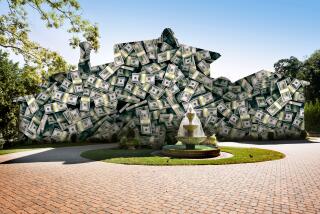THE BUSH BUDGET : Luxury Tax Is a Luxury Nation Cannot Afford, Industries Say
- Share via
Tim Hanson had heard that the luxury tax placed on expensive boats could be lifted, but as he helped set up for the Southern California Boat Show at the Convention Center, the news was just sinking in.
“Yee-haw!” crowed Hanson, service manager for Marine Center Inc., a Pomona power boat dealership. “The taxes on boats are discouraging a lot of people from buying them. If they drop the tax, I bet things will change.”
In his 1993 annual budget Tuesday, President Bush called for the repeal of the 10% luxury tax on boats and private planes. Although the tax also applies to some furs, jewelry and luxury automobiles, no repeal was proposed for those goods.
Those who manufacture and sell such luxury items blame recent poor sales on the luxury tax. But the levy, which went into effect just a year ago, is not the only villain. The deepening recession and the end of the ostentatious ‘80s have also curbed America’s spending habits.
Hanson and others in the boating industry said sales of boats have been down since 1988; the weak economy was the original culprit, and the tax on boats costing more than $100,000 has made the situation worse. The tax, part of a five-year effort to cut the federal budget deficit, was expected to generate about $1.5 billion in new revenue through 1995.
The proposed repeal of the tax was reassuring for boat manufacturers, such as Catalina Yachts, which laid off about 350 employees--half its work force--last year, when sales dropped by about 40%, said Sharon Day, national sales manager for the Woodland Hills-based boat maker.
“We had to cut production and lay off people who have worked here for up to 15 years,” said Day, whose company manufactures yachts that sell for as high as $275,000. “We definitely plan to do some rehiring if the tax is lifted.”
While the proposed tax elimination could benefit the boating and aviation industries, those industries who would still bear the luxury tax burden--jewelers, furriers and auto dealers--are feeling left out.
Paul Burckin, sales manager of Hollywood Sport Cars Inc., said he would like to see a similar repeal proposal on the 10% tax placed on his Ferraris. Although Burckin said sales are OK, they could be better if the tax was lifted.
“It hurts business,” he said, “the tax really is not good for business. It’s costing money instead of making money for the government--with the jobs lost. Nobody’s collecting those taxes if nobody’s buying those products.”
The fur industry expressed similar discontent with the 10% luxury tax imposed on furs costing more than $10,000.
Felix Pressburger, owner of Somper Furs in Beverly Hills, said the tax on higher-priced fur coats creates “bureaucratic expenses that are counterproductive to the government.
“There are not all that many luxury furs sold for more than $10,000; most furs sold today are under $10,000,” Pressburger said. “It would behoove the President to get rid of the luxury tax on furs because it’s probably a pain in the neck and counterproductive to collect the tax.”
The aircraft industry welcomes Bush’s proposed repeal of the tax, which has generated only $53,000 in federal revenue but has cost the industry sales and jobs, said Edward W. Stimpson, president of the General Aviation Manufacturers Assn. in Washington.
Stimpson said that the U.S. general aviation manufacturers shipped only 1,021 planes in 1991--”the lowest annual total since World War II.”
The tax has “created really no revenue and has depressed the market,” he said. “We are extremely pleased (about the move to repeal the tax). The tax is just one more nail that is hurting the market.”
But at the boat show, organizers were cautious this week, hoping that the President’s proposal--if enacted--would help boost sales after the industry’s worst year since 1983.
Sales of boats and boating equipment in the United States grew steadily through the 1980s, peaked in 1988 at nearly $19 billion and slipped to $10.6 billion in 1991, according to Chicago-based National Marine Manufacturers Assn.
The luxury tax placed on the more expensive boats has not affected the wealthy, as many in Congress argue, but has hurt blue-collar workers who have lost their jobs because of slow boat sales, said David Broome, vice president of government relations at the association.
Broome estimated that more than 19,000 boat manufacturing jobs were lost in 1991, and he blames the luxury tax.
Staying Afloat
National sales of new boats and boating accessories climbed in the 1980s, peaking in 1988. But the slowdown in the economy and the 10% luxury tax placed on boats costing more than $100,000 have sunk sales in the 1990s, industry sources say. 1980: $7.37 1988: $17.931991: $10.56 Source: National Marine Manufacturers Assn.
More to Read
Inside the business of entertainment
The Wide Shot brings you news, analysis and insights on everything from streaming wars to production — and what it all means for the future.
You may occasionally receive promotional content from the Los Angeles Times.










